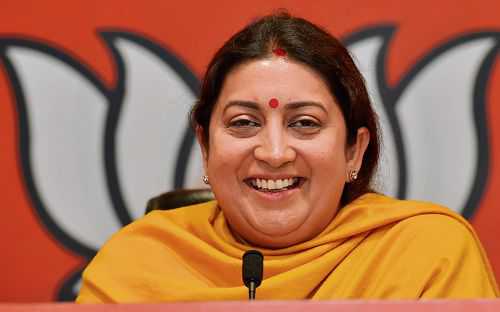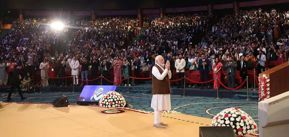
Giant-killer: Women in some Amethi villages had said they would vote en bloc for Smriti Irani because they got toilets for the first time.
Radhika Ramaseshan
Senior journalist
Amethi is a sign of the shifting sands of politics in the Hindi heartland. The Congress should have anticipated in 2014 itself that its president, Rahul Gandhi, was lucky to have retained his constituency in that election and would have to work several times harder to keep it five years later. Smriti Irani, the Bharatiya Janata Party (BJP) candidate, has wrested the marquee seat after a gruelling battle which gave her an upper hand because most people in Amethi desired a break from the Gandhis and thought they had found the right person and the right party to effect the change.
Uttar Pradesh displayed enough indications in the 2019 elections that it wants to snap out of the ‘mai-baap’ culture, the politics of patronage that the Congress had perfected. Help to the irredeemably backward Amethi came in dribs and drabs. A promise now and fulfilment in such small measures that half-way through, people forgot what the promise was about. The BJP stepped in to fill the breach caused by benign feudalism, a form of the absentee landlord system wherein the Gandhis would make seasonal appearances, stage road shows and wave at the crowds and disappear. The BJP and Smriti introduced a pro-active form of engagement that entailed frequent visits, building a party organisation (mostly of defectors from the Congress and other parties), engaging with the workers and unveiling largesse from the Centre.
Women in some Amethi villages said they would vote en bloc for Smriti because they got toilets for the first time. Even the most rudimentary structures, with no lights and running water, marked a lifestyle change from the ‘shame’ they endured from going into the fields or not going at all at night and suffering kidney-related ailments as a result. They were certain if Smriti was elected and even if the BJP was not voted back to power at the Centre, she would leverage her ‘power’ to bring more ‘conveniences’ to them. Rahul held little hope, in contrast.
The skepticism that crept in about the incompatibility of feudalism with democracy and empowerment of the poor, even by bringing toilets, was correlated to an increasing antipathy towards dynastic politics and the ‘enrichment’ of a few families at the cost of the voters. Such sentiments were articulated in the seats from where the Gandhi family members contested. Apart from Amethi, one sensed a certain impatience with the dynasts in Sultanpur (Maneka Gandhi) and Rae Bareli (Sonia Gandhi).
Therefore, if the UP gathbandhan of the Samajwadi Party (SP)-Bahujan Samaj Party (BSP)-Rashtriya Lok Dal (RLD) was forged to bring certain ‘dominant’ castes together in a purportedly winning combination, even the supporters qualified their endorsement with a certain disquiet about the fact that the SP and RLD chiefs, Akhilesh Yadav and Ajit Singh, respectively, were legatees and, therefore, were as ‘entitled’ as the Gandhis. This feeling was noticeable among the younger members of their communities, the Yadavs and Jats, who contrasted the ‘rise’ of the scions through ‘birthright’ with the ‘hard work’ and ‘struggle’ put by Prime Minister Narendra Modi to reach where he has and was ‘worthier’ of their support.
Modi also stood out because the Opposition lacked a matching leader to lead the government at the Centre. Rahul was dismissed out of hand. BSP chief Mayawati, who regrouped her Dalit voters after losing some of them to the BJP in 2014 and 2017, continued to evoke negative memories of her rule, emblematised in the money she allegedly built in raising parks and statues, commemorating Dalit icons. Akhilesh was not taken seriously as a national leader but his repeated suggestion that Mayawati could be the next PM consolidated the upper castes even more solidly behind the BJP and against the gathbandhan, except in stray places where Brahmins had a problem with a Bhumihar or a Rajput candidate.
In sum, the BJP had a decisive edge over the Opposition because the election was mostly perceived as a referendum on the Centre, although people expressed dissatisfaction with the state government on several scores. In the end, their refrain was, “But we must keep the country safe and secure.”
Have such sentiments relegated the place of caste in UP politics to the background? Not by a long shot. The BJP’s victory was underpinned now, as in the past two elections, on the winning formula worked out by the party president, Amit Shah, of bringing the upper castes, the non-Yadav backward castes and the non-Jatav Dalits under one umbrella.
Shah’s acumen lay in the discovery of the multiple backward castes that were kept out of the benefit accruing from the reservation policy that raised two generations of socially and professionally empowered young people from castes such as the Yadavs, Kurmis and Lodh-Rajputs. Among the castes he targeted were the Mallahs, Rajbhars, Kushwahas and Bhinds, nurtured their leaders, weaned away local influencers who were with the SP or BSP, and held caste-specific meetings.
Similarly, the Dalit sub-castes the BJP surmised were unlikely to vote for Mayawati were reached out to. These were the Passis, Valmikis, Ravidassias and Doms. Playing on their sense of self-respect and perceived neglect by the ‘elite superiors’ were enough to achieve what the SP and BSP tried to do at various points but could partially: knit the teeming population of backward castes and Dalits into a support block that combined with the upper castes ensured that the BJP stayed on course.
On the other hand, the gathbandhan sat on a limited social reservoir of the Jats, Yadavs, Jatavs and Muslims. While the combination looked formidable in places, it could be effective only when these groupings voted together in large numbers. That didn’t quite happen. In western UP, the Jats were split down the line between the RLD and the BJP and perhaps voted in large numbers for the latter. In places, the Congress weaned away Muslim votes while the Yadavs, impacted by Hindutva, said they were distinctly ‘uncomfortable’ with the Muslims that the gathbandhan had nominated even as they insisted that there was no religious polarisation.
The BJP has retained UP, but the gathbandhan that seemed surcharged at the start has to live with a massive failure that could impact its durability. It may unravel sooner than expected.



























